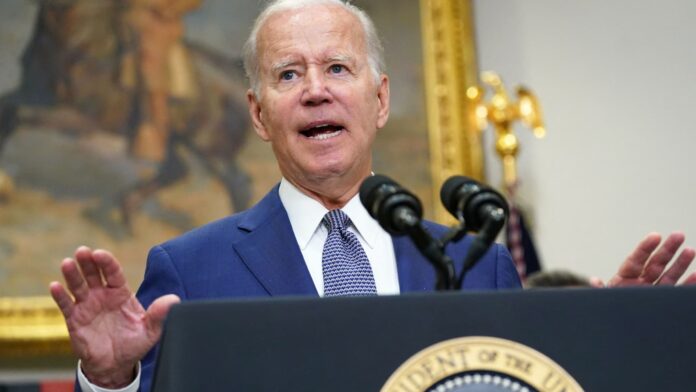U.S. President Joe Biden speaks before signing an executive order to help safeguard women’s access to abortion and contraception after the Supreme Court last month overturned Roe v Wade decision that legalized abortion, at the White House in Washington, July 8, 2022.
Kevin Lamarque | Reuters
Calling the U.S. Supreme Court “out of control,” President Joe Biden signed an executive order Friday designed to bolster access to abortion in states that are banning it following the court’s ruling two weeks ago to overturn the constitutional right to terminate a pregnancy.
Biden, flanked by Vice President Kamala Harris and Health Secretary Xavier Becerra, rebuked the conservative majority on the court for stripping U.S. citizens of fundamental rights he said were protected by the Constitution, such as the right to privacy in health matters like seeking an abortion.
“We cannot allow an out-of-control Supreme Court working in conjunction with extremist elements of the Republican Party to take away freedoms and our personal autonomy,” he said from the White House.
The president called out Justice Clarence Thomas’ comments in a concurring opinion overturning Roe v. Wade that invited challenges to past rulings on contraceptive access, gay marriage and other issues.
“What century are they in?” asked an incredulous Biden, who promised to veto any future Republican-led effort to ban abortion nationwide. The Affordable Care Act guarantees women free birth control and contraceptive counseling.
Biden then signed an executive order that promises to protect the safety of abortion patients and providers and access to the procedure through mobile clinics near the borders of states that restrict access to abortion.
The order also instructs the Department of Health and Human Services to issue a report within the next month detailing actions to safeguard medication abortion, ensure access to emergency contraception and IUDs and bulk up reproductive education.
It directs HHS to take steps to protect access to the abortion pill, though it’s still not clear what exactly the federal government plans to do. The Food and Drug Administration approved the abortion pill, mifepristone, more than 20 years ago as a safe and effective way to end a pregnancy before the 10th week.
In December, the FDA permanently allowed the pill to be sent by mail from licensed pharmacies and health-care providers. Planned Parenthood, a health care provider that supports access to abortion services, praised the decision at the time as a significant expansion of reproductive rights.
The order comes two weeks after the Supreme Court voted to reverse its landmark 1973 Roe v. Wade decision and end 50 years of legal precedent. At least eight states, including Texas, Alabama and Missouri, have banned abortion so far, and another dozen are expected to restrict or outlaw access to the procedure over the next two months.
Democrats, enraged and upset by the court’s decision, have pressure Biden and Congress to do more to respond to the ruling. And while the order is an attempt to quell some of that public outrage, the directive is vague and leaves much of the details to be worked out by Becerra and legal experts.
Biden also directed HHS on Friday to ensure that pregnant women who are experiencing miscarriages and other complications have access to emergency medical care.
Abortion rights activists are worried that medical professionals will delay treatment for miscarriages and ectopic pregnancies for fear that state prosecutors might interpret these interventions as a type of abortion.
Abortion rights advocates have urged lawmakers to suspend to the Senate’s filibuster rules that require a minimum of 60 votes to carry legislation through the chamber, a monumental task in a chamber split 50-50 between Democrats and Republicans, who largely support the court’s decision to reverse Roe.
Biden acknowledged that reality in his White House address Friday and urged Americans to vote in the upcoming midterm elections this November.
“The fastest way to restore Roe is to pass a national law codifying Roe, which I will sign immediately upon its passage at my desk,” he said.
Women who live in states banning abortion either have to order the pill from overseas, which carries some risks, or cross state lines to receive a prescription in a state where the procedure remains legal.


